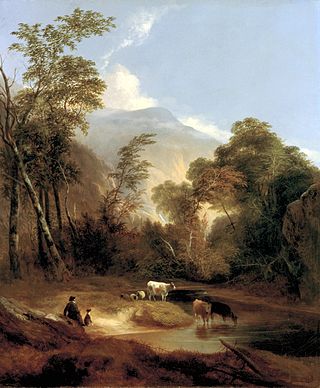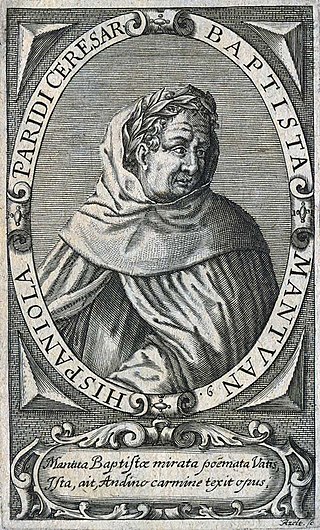Related Research Articles
Latin literature includes the essays, histories, poems, plays, and other writings written in the Latin language. The beginning of formal Latin literature dates to 240 BC, when the first stage play in Latin was performed in Rome. Latin literature would flourish for the next six centuries. The classical era of Latin literature can be roughly divided into the following periods: Early Latin literature, The Golden Age, The Imperial Period and Late Antiquity.

Publius Vergilius Maro, usually called Virgil or Vergil in English, was an ancient Roman poet of the Augustan period. He composed three of the most famous poems in Latin literature: the Eclogues, the Georgics, and the epic Aeneid. A number of minor poems, collected in the Appendix Vergiliana, were attributed to him in ancient times, but modern scholars consider his authorship of these poems as dubious.

Jacopo Sannazaro was an Italian poet, humanist and epigrammist from Naples.

The pastoral genre of literature, art, or music depicts an idealised form of the shepherd's lifestyle - herding livestock around open areas of land according to the seasons and the changing availability of water and pasture. The target audience is typically an urban one. A pastoral is a work of this genre. A piece of music in the genre is usually referred to as a pastorale.
An eclogue is a poem in a classical style on a pastoral subject. Poems in the genre are sometimes also called bucolics.

The French poet Jacques Delille came to national prominence with his translation of Virgil’s Georgics and made an international reputation with his didactic poem on gardening. He barely survived the slaughter of the French Revolution and lived for some years outside France, including three years in England. The poems on abstract themes that he published after his return were less well received.

A national epic is an epic poem or a literary work of epic scope which seeks or is believed to capture and express the essence or spirit of a particular nation—not necessarily a nation state, but at least an ethnic or linguistic group with aspirations to independence or autonomy. National epics frequently recount the origin of a nation, a part of its history, or a crucial event in the development of national identity such as other national symbols.

The Georgics is a poem by Latin poet Virgil, likely published in 29 BCE. As the name suggests the subject of the poem is agriculture; but far from being an example of peaceful rural poetry, it is a work characterized by tensions in both theme and purpose.

James Henry was an Irish classical scholar and poet.

Christian poetry is any poetry that contains Christian teachings, themes, or references. The influence of Christianity on poetry has been great in any area that Christianity has taken hold. Christian poems often directly reference the Bible, while others provide allegory.

The Appendix Vergiliana is a collection of poems traditionally ascribed as being the juvenilia of Virgil.
Western literature, also known as European literature, is the literature written in the context of Western culture in the languages of Europe, as well as several geographically or historically related languages such as Basque and Hungarian, and is shaped by the periods in which they were conceived, with each period containing prominent western authors, poets, and pieces of literature.
A cento is a poetical work wholly composed of verses or passages taken from other authors, especially the Greek poet Homer and the Roman poet Virgil, disposed in a new form or order.

Baptista Spagnuoli Mantuanus was an Italian Carmelite reformer, humanist, and poet.

A poet is a person who studies and creates poetry. Poets may describe themselves as such or be described as such by others. A poet may simply be the creator who creates (composes) poems, or they may also perform their art to an audience.
The Sortes Vergilianae is a form of divination by bibliomancy in which advice or predictions of the future are sought by interpreting passages from the works of the Roman poet Virgil. The use of Virgil for divination may date to as early as the second century AD, and is part of a wider tradition that associated the poet with magic. The system seems to have been modeled on the ancient Roman sortes as seen in the Sortes Homericae, and later the Sortes Sanctorum.

Eclogue4, also known as the FourthEclogue, is the name of a Latin poem by the Roman poet Virgil.

Cento Vergilianus de laudibus Christi is a Latin poem arranged by Faltonia Betitia Proba after her conversion to Christianity. A cento is a poetic work composed of verses or passages taken from other authors and re-arranged in a new order. This poem reworks verses extracted from the work of Virgil to tell stories from the Old and New Testament of the Christian Bible. Much of the work focuses on the story of Jesus Christ.

Patrick Gerard Cheney is an American scholar of English Renaissance Literature. He is Edwin Erle Sparks Professor of English and Comparative Literature at the Pennsylvania State University.
Karl Watts Gransden was a British poet and an editor, translator, scholar, and teacher of Latin and English literature. He spent his career at the British Museum and the University of Warwick.
References
- Cheney, Patrick; A. de Armas, Frederick (2002). European Literary Careers: The Author from Antiquity to the Renaissance. Toronto: Toronto Press Incorporated. ISBN 0802047793
- Coolidge, John S. "Great Things and Small: The Virgilian Progression". Comparative Literature 17.1 (1965): 1 - 23.